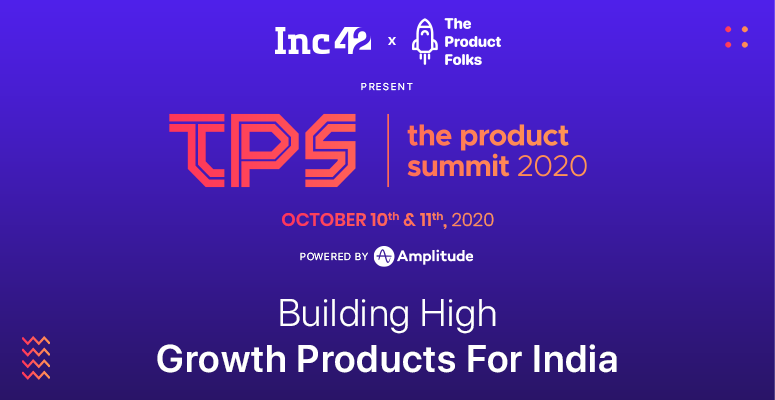

This article is part of The Product Summit 2020, India’s largest virtual product conference, to be held on October 10th & 11th, 2020. Click here to know more!
What’s the common strand in the careers of Alphabet CEO Sundar Pichai, Microsoft CEO Satya Nadella and former Yahoo CEO Marissa Meyer? They all worked as product managers on the way to taking the top job — a trend that’s becoming more and more prominent in Indian tech startups too.
This is why the product role has assumed relevance in recent years that was not seen earlier. A lot more youngsters today know about the career trajectory of a product manager or a product chief and many are planning careers in this direction.
While there’s a lot of literature available on product development and growth to help them start their journey, there’s a huge deficit in terms of access to the mentorship of seasoned product managers that have actually earned success in India.
For instance, founders and product owners might not know how to prioritise the right features for the current stage, or know about UI/UX nuances or even pricing and positioning determines product development.
While entrepreneurs and product leaders might huddle to share their collective wisdom with each other on these aspects every once in a while, there’s not yet a culture of writing and talking about building world-class products in India.
Thus, in an effort to bridge the knowledge gap, Inc42 and TPF’s The Product Summit will be bringing India’s brightest product stars together later this next week. And in the run-up, we spoke to product-centric startup founders on their key learnings in the product journey as well as lessons that can be shared with those who are starting out. In other words, these are the product building tips that they wish they knew when they began their journey.
Register For The Product Summit
Pallav Nadhani
A founder and investor, Pallav Nadhani sold his 18-year-old startup Fushioncharts to Idera in March this year. The bootstrapped data visualisation platform was profit-making and intensely focussed on products with tools that supported developers in building user-friendly, visually-appealing dashboards for projects.
Nadhani, who recently founded another data visualisation platform called charts.com, believes it’s important to keep the ideal customer profile very simple and deliver maximum value for them before moving to adjacent markets or different customer segments.
His second tip for product management beginners is that customer experience is not just in the UI of a product — it also captures the pre-sales experience on the web and the documentation experience along with the actual product.
Nadhani believes that it’s important to give a voice to the brand and make it human so that people can relate to it and the product highlights how a company is different from others in the space. This is also becoming more and more commonplace in the app world, with strong personality-led apps such as Zomato, Cred, Swiggy and others.
Given that a lot of traditional offline brands are coming online in the wake of the pandemic, Nadhani said keeping technical details such as licensing simple and pricing easy to understand is crucial, especially where sales execs cannot communicate with customers directly.
His final and perhaps the most important piece of advice to novices is — “Talk to your customers often”.
“Ask them hey how are you solving the problem that you intended to solve and what more you can do for them — that’s a great way to build relationships and also get new ideas,” he adviced.
Akshay Mehrotra
Akshay Mehrotra, the CEO and cofounder of digital lender EarlySalary, was a marketing professional before taking the entrepreneurial plunge. He had a stint as the chief marketing officer of insurance aggregator platform PolicyBazaar and has worked in multiple industries such as banking, ecommerce, consumer services, among others, as a marketer.
Mehrotra, who heads the product strategy at EarlySalary, said that as an early-stage startup evolves into a more mature company, product managers need to be given the freedom to conceive and implement ideas of their own.
Mehrotra said that product managers should avoid making any concessions while testing an idea — working with a concept just because a CXO floated it shouldn’t be the case. It is also important for a PM to take time out and work with the front line team to understand what customers really want.
Soham Chokshi, Cofounder, Shipsy
After graduating from IIT Madras and working at Deutsche Bank as an analyst, Soham Chokshi struck out on his own with logistics solutions provider Shipsy in mid-2015. The startup aims to create data-driven products to improve operational efficiency in the supply chain industry.
He says that it is important to define at the outset who the customer is and why they should pay for a product, which in turn would determine the pricing strategy.
“Ensure that internal and external tools for providing best-in-class support are an integral part of the product roadmap from Day 1,” emphasised Chokshi.
According to him, a product leader must work with the beta customers — it has enough diversity and set clear metrics to define what the pilot’s success would look like. Clear targets and trends on user adoption are a key to success, he added.
Register For The Product Summit
Sameer Ramesh
Sameer Ramesh began his startup journey even before graduating from college, cofounding edtech platform MyCaptain. Ramesh heads product development at the startup, which helps students pursue their passions in the arts, technology and business by connecting them with mentors in their particular fields.
The co-founder and chief product officer of MyCaptain offer a quick hack that can also work wonders for a product leader — breaking down goals for the quarter, month and week and so on.
“There will always be a giant backlog, and when you start it will feel overwhelming. Often I used to overestimate what I could do in a day and underestimate what I could accomplish in a week,” he said.
Ramesh stressed that having clear channels of communication in a product team is essential, adding “Share the problems and the plans with everyone in the team. A product leader can’t work in a silo.”
Achin Bhattacharyya
Achin Bhattacharyya is a chartered accountant and rose to be a director at Deloitte after working with big names such as PwC, KPMG and General Electric. He took the entrepreneurial plunge in 2018 with Notebook, after a sabbatical spent traversing the length and breadth of the country to understand the challenges of shaping young minds.
The CEO and founder of the edtech platform said that a product leader should continuously question everything so that there’s scope for innovation. However, that doesn’t mean sacrificing everyday goals at the altar of ideating for the long term.
“The key learning has been striking the right balance between R&D and day to day operations — but it’s really important to get your act right on this one,” he stressed.
Bhattacharya also cautioned that there isn’t any winning formula to help a product owner succeed in perpetuity which is why being open and receptive to changes is the key.
“Cross-training your key team members is really important and having self-explanatory SOPs will help any new hire to come up to speed,” he said.
Amit Bansal
Amit Bansal started his career as a sales manager at Asian Paints but then changed tracks to pursue a career in product management that took him to various software companies in the US. After rising up the ranks to become the product head at Talisma, Bansal decided to strike out on his own.
The founder and CEO of WizKlub Learning, an edtech startup that runs online coding classes for kids aged 6-14, said a product owner should think deeply about what motivates users to adopt a product.
“Intrinsic motivation is driven by internal factors such as having fun and extrinsic motivation involves an external reward like a coupon code or gift. A great product manager understands this and is able to create features accordingly,” he added.
A product owner needs to think in terms of user delight instead of going for features they want to see and bloating up the product.
To illustrate this, Bansal said “The 20% features which get used 80% of the time deserve the most attention. These features are going to be the ones that ensure stickiness.”
Pallav Nadhani will be speaking at The Product Summit — India’s First And Largest Virtual Product Conference, supported by Amplitude, AWS, Dell, and DigitalOcean, scheduled for 10th & 11th October 2020. Register Now!
The post Founders On Things They Wish They Knew Before Embarking On Their Product Journey appeared first on Inc42 Media.
Author: Deepsekhar Choudhury
Source : https://inc42.com/features/things-no-one-tells-founders-before-their-product-journey-begins/
Date : 2020-10-03T07:28:42.000Z
